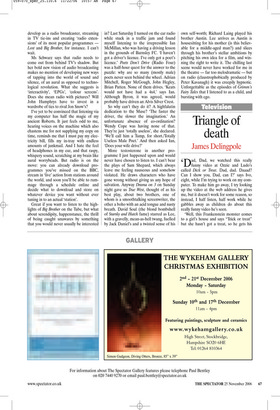Triangle of death
James Delingpole
‘Dad, Dad, we watched this really funny video at Ozzie and Ludo’s called Dick or Treat. Dad, dad. Daaad? Can I show you, Dad, can I?’ says Ivo, eight, while I’m trying to work on my computer. To make him go away, I try looking up the video at the web address he gives me, but it doesn’t work for some reason, so instead, I half listen, half work while he gabbles away as children do about this really funny video he’s seen.
‘Well, this Frankenstein monster comes to a girl’s house and says “Trick or treat” but she hasn’t got a treat, so he gets his willy out and she bends over and he puts it ... !’ WHAT? God, I hate this horrible new world of technology where you can’t leave your kids for five minutes without them dialling up revolting hardcore porn or snuff videos. ‘Oh, come on it’s not that bad. Remember when our parents used to discover our porn stash?’ said one of the other dads during the inquisition we had afterwards as to which parent was to blame for our children being corrupted. But the difference was, back in those days, we at least had a chance to reach puberty before seeing anything quite so graphic. If my son turns gay as a result of the shock, I’m telling you now I’m going to sue Tim Berners-Lee for everything he’s got.
Had Ivo been watching Saddam’s Road to Hell (Channel 4) with me on Monday evening, he would have got to see his first snuff video, too. It was a short but horrible clip of a man being thrown off a roof, taken from one of the videos widely available in Iraq, showing Saddam’s secret policemen torturing and killing their victims. You’d think these secret policemen would now want this evidence of their atrocities covered up, but you’d be wrong: they’re actually the ones who are packaging and releasing these vids, as a reminder to the Iraqis that this is what they are capable of and that they haven’t gone away.
Our guide on the documentary was Dr Mohammed Ihsan, the minister for human rights in Iraq’s Northern Regional Government. An extraordinarily brave film-maker, Gwynne Roberts, followed him on one of the most dangerous journeys on earth from Kurdish Iraq through Baghdad to the ‘Triangle of Death’ as he tried to trace the whereabouts of 8,000 Kurds of the Barzani clan executed by Saddam in 1983 for having taken the wrong side during the Iran/Iraq war.
It was not an easy task. ‘Wot us, guv? Naah. Never seen nuffink,’ was the response of the Saddam-friendly villagers near the Saudi border who’d helped to supervise the killing. Once a suitably vast bribe had been offered, one or two of them did suddenly regain their powers of recall. Unfortunately, just as Ihsan looked as if he might be getting close to his quarry, he and his heavily armed convoy had to make a swift exit because some ‘insurgents’ had been spotted circling like sharks and if they hung about any longer they’d end up sharing the fate of the Barzanis.
Saddam’s Road to Hell reminded me why I watch so very few of the many no-doubtexcellent documentaries shown on TV about Iraq: because they’re so damnably depressing. You think, ‘Surely there must be a glimmer of hope somewhere,’ but there never is. How unimaginably ghastly must it be to live in a country where, if you’re not rich enough to buy your way out, you face the very real possibility, every time you go to work, of being kidnapped and either beheaded or tortured to death with an electric drill?
Now that the British/US involvement in Iraq has turned out so badly, there has arisen a popular and almost unchallenged narrative that the explosion of violence is all the fault of one or two shadowy neocons, that Iraq never posed any threat to the West, and that frankly it was doing just fine under Saddam before Blair and Bush went in and rocked the boat. Saddam’s Road to Hell was a timely reminder of what unutterable drivel this narrative is. It wasn’t neocons who murdered and gassed those thousands of Kurds, Shias and Marsh Arabs. It wasn’t Westerners who made the Iraqis so expert in the art of refined cruelty. ‘After all that has happened, I don’t think we can ever live together,’ said Dr Ihsan. ‘We are like a sick person who is not accepting his sickness.’



























































































 Previous page
Previous page